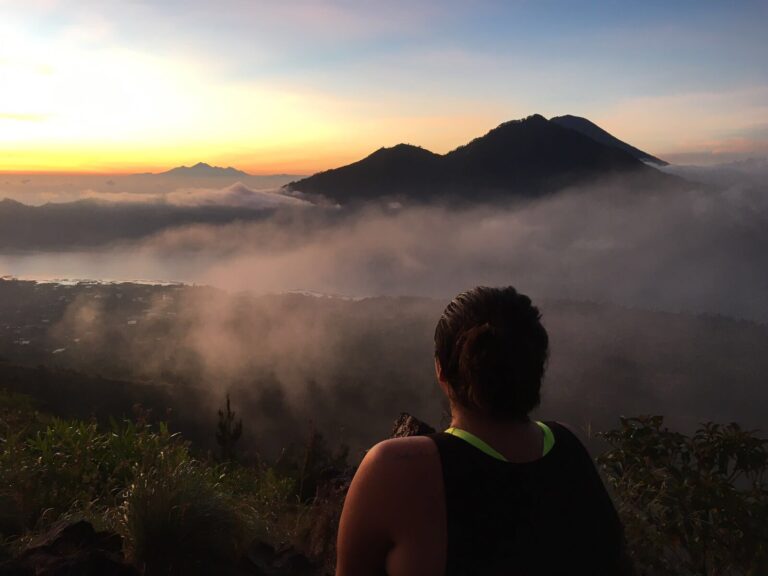My 4 Truths Traveling and Living Abroad as a Latina
The truth about traveling and living abroad as a Latinx is different for every Latinx. We come in all different shapes, sizes, skin colors, so ask anyone, and you will get different experiences. I have traveled, volunteered, and lived abroad, so here are my 4 Truths traveling and living abroad as a Latinx.
1. Let’s Talk about Safety as a Latinx
There is always the question about safety traveling as a woman. When I told my dad I decided to quit and move to Chile, safety was one of his main concerns.
There is always a risk when traveling, but I have realized that I stand out less in my experience. What I mean by that is I do not scream tourists or foreigners at first glance. I find that it gives me peace of mind when traveling on public transportation or streets. I draw less attention. In Chile, Bali, Europe, I’ve been mistaken for a local. It minimizes the target on my back, and if you speak the language even better. Traveling in Latin America, communicating in Spanish always helps. Of course, depending on your accent, people will notice but speaking the language helps.
I am not saying traveling as a Latinx makes you free from any harm, because it doesn’t. Safety is always a worry for female solo travelers; I found my Latinx has played to my advantage in certain circumstances.
2. Microaggressions abroad as a Latinx
We often talk about microaggression in the states, but how about our experience abroad? For me, when I am just traveling, I am not usually aware of it. It wasn’t until I reflected on my time volunteering and living abroad that I started to parallel my experience here and abroad.
In the states, if someone says, ” Your English is really good?” or “Where did you learn English?” We would think it is unacceptable. Well, I got those questions a lot when I worked abroad. Teaching abroad, a lot of my students or teachers asked where I had learned English? On the surface, this question seems harmless, like it once did here, but it still comes from the same place. You start to think, and you ask yourself, did any of the other participants, who were white, get asked the same question. I realize that it is because I do not look like what they associate as the stereotypical American. They are only familiar with a certain type. The majority of media and pop culture they consume from the states does not represent all people from the U.S. You almost feel like you have to ‘prove’ your American. That I, too, was born and raised there.
3. Colorism
Colorism is a topic I think the Latinx community is familiar with. It is discrimination of darker skin. The idea that light skin is valued more than dark. This issue is very deep-rooted in our history as Latin America. It plays a role in how people see their people and foreigners. Similar to Microagreesion, I did not think of this too much until I had returned home.
Working abroad, you can tell the importance a white man has over a Latinx woman, even if we are both from the same country. My co-worker’s treatment from other workers was different from my treatment. Many of the times, the treatment was unintentional. I do not think anyone actively made an effort, but because in our society, the idea of colorism is so engrained, it was very evident to me. It made me think about why it was different. Why was he held to another, maybe higher regard if we are from the same country? This was not the only time.
Bali
When I was in Bali, a group of us went on a weekend trip. Although we were from different countries, the participants came from Europe, Australia, and the U.S and were predominately white, blonde hair. One moment sticks out in particular. A few of us were on a weekend trip, and I was a little ahead when a group of girls stopped us and asked to take a picture with them. They pointed to the other girls, and I immediately knew why. It was very evident. They were taller, lighter skin than me, blonde hair, they were different. I was very tanned, short, and had dark hair. I was quickly dismissed for how I looked. Nonetheless, my friends included me in the photo, probably not realizing what I saw and felt in the interaction that lasted 2 minutes.
4. Representation Matters
What is the point of mentioning all this? Representation Matters. In the travel space, there are not a lot of Latinx and BIPOC of color. If you combine some of the Latinx Traveller Instagram accounts, you will not reach some of the most popular Travel Vloggers and Bloggers out there. I have volunteered and lived, and in my particular case, I have been the minority. The majority of people are white. It speaks volumes and shows a lack of opportunity and representation in the travel space. So I am here, and hopefully, you are too to claim some of that space.
Traveling and living abroad as a Latinx will be a unique experience, no matter where you go. Some of those experiences will be wonderful; others will not be. That is how travel works. One thing is sure; there should be more representation out there. Being in these spaces, unapologetically ourselves plays a crucial role in tearing down these stereotypes and misconceptions of what an American looks like. It aids in creating a more open and inclusive world.






